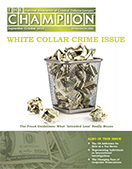September/October 2016

In this month’s issue, find out how fraud guideline amendments regarding “intended loss” can benefit white collar defendants.
Articles in this Issue
-
Affiliate News
Affiliate News for September - October 2016 Champion.
-
Book Review: Inside the Cell - The Dark Side of Forensic DNA
For criminal de-fense attorneys who are only casually familiar with the limitations of for-ensic DNA testing, Erin Murphy’s In-side the Cell will be an invaluable read. Murphy presents a notoriously complex subject in a way that will be digestible to attorneys who do not have a deep background in forensic science and who may very well be intimidated by it. Murphy’s analogies make the highly technical subject matter accessible, while her numerous real world examples of forensic DNA testing failures make it a compelling read for anyone interested in understanding the shortcomings of the field. As she lucidly explains, the breadth and gravity of these shortcomings cannot be overstated.
-
Book Review: Leaning on the Arc - A Personal History of Criminal Defense
Gerry Schwartz-bach, a true artist in the criminal defense world, has crafted a powerful and very engaging reflection on his work on behalf of the accused that is part memoir, part teaching tool, and entirely inspiring for anyone coping with the conflict between justice and the justice system. The title, Leaning on the Arc, draws from the Martin Luther King observation that “the arc of the moral universe is long, but it bends toward justice.” Schwartzbach sketches a brief but engaging tour of the experiences that led him to a life in the law. His shared discovery of the potent prospect of making a difference, one life at a time, emerges from the story and resonates for the reader. It powerfully compels his journey forward. The book then shifts, transporting the reader into the very heart of the celebrated and lesser-known cases of his career, in a fashion that is inspiring, fascinatingly informative, and revealing of his method of strategic thinking, so essential to creating unimaginable outcomes from very desolate-appearing facts.
-
From Bean Counting to Soul Searching: The Amended Definition of ‘Intended Loss’
in the Fraud Guidelines
For the purpose of determining the amount of loss from economic crime, in 2015 the Sentencing Commission amended the fraud guidelines (U.S.S.G. § 2B1.1) to clarify that “intended loss” means “the pecuniary harm that the defendant purposely sought to inflict” on the victim. The authors discuss two cases, one decided by the Seventh Circuit and one pending in the Third Circuit, that demonstrate how the recent amendments concerning intended loss can benefit white collar defendants.
-
From the President: How to Elevate Criminal Defense Before the Supreme Court
While NACDL cannot compel the Supreme Court to change its rules, it can and should advocate for changes that allow it and other groups like it to be heard in oral argument before the Court on behalf of criminal defendants.
-
Getting Scholarship Into Court Project
Getting Scholarship Into Court Project - September/October 2016 Champion.
-
Inside NACDL: Will a Summer of Unease Halt the Momentum for Criminal Justice Reform?
To the extent that isolated acts of violence against police officers or random attacks on civilians divert attention from the underlying need for policing reform, they immeasurably compound the nation’s tragic failure to deal with disparate policing practices and their negative impact on communities of color.
-
Representing Individuals in International Investigations
The U.S. Department of Justice sees its beat as worldwide, focusing on transnational criminal enterprises and global corporate misconduct. As a result, it is now standard for companies to respond to the DOJ’s demand for cooperation by launching internal investigations worldwide. International investigations promise to become more and more common. Defense counsel must be prepared to encounter an abundance of issues, including the following: the domestic and extraterritorial applications of U.S. law; likelihood of extradition; effect of a parallel investigation on the right against self-incrimination; data privacy; and the logistics and process for conducting an interview through a mutual legal assistance treaty.
-
The Changing Face of Corporate Prosecutions
As legal persons, corporations can be criminals too — and never before has corporate criminal enforcement been so important in this country and across the globe. Billion dollar corporate criminal fines are now common events. Judges have intervened to supervise corporate prosecution agreements, and appellate courts have intervened to frustrate such supervision. Brandon Garrett gives an overview of the changing landscape of corporate criminal enforcement. He describes the trends in data collected on corporate prosecutions, including the remarkable rise in the size, but not the numbers, of federal corporate prosecutions in recent years. In addition, he discusses policy, including legislative proposals and changes to Department of Justice strategy. Finally, Garrett describes the changing global landscape, as other countries have reacted to and even imitated U.S.-style corporate prosecution approaches. Whether the billions in fines paid will have a real deterrent and preventative effect going forward may hinge on what the Department of Justice does next and how the next Department of Justice views its remarkable new role.
-
Turning the Tide: The US Addresses Its Role as a Tax Haven
The U.S. banking system and other U.S. investments such as real estate are prime targets for people seeking to evade the tax systems of their home countries and for people trying to hide the proceeds of unlawful conduct. Kathryn Keneally and Michael Scarduzio discuss some of the new tools and long-standing legal principles the government is using to implement new disclosure requirements and conduct investigations aimed at the use of U.S. entities, bank accounts, and investments to evade foreign taxes.
-
White Collar Crime Policy: Once Again, SCOTUS Scolds DOJ for Overreaching
The Supreme Court sent a clear message in McDonnell v. United States (2016) – stop overreaching in public corruption cases. McDonnell highlights a major concern that NACDL has focused on for years: prosecutors’ abuse of vague statutes that use broad definitions of prohibited conduct.
